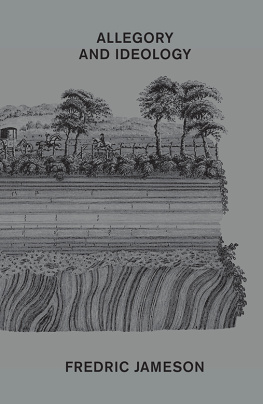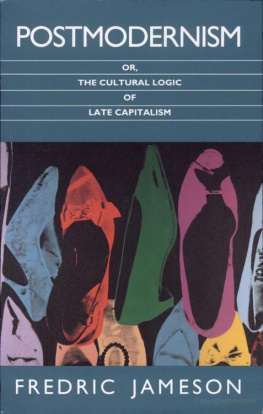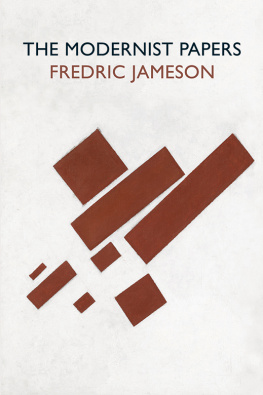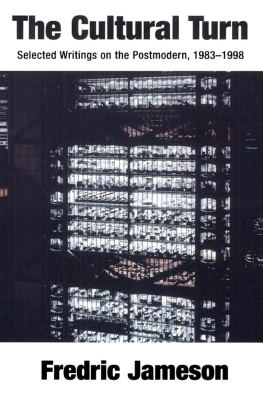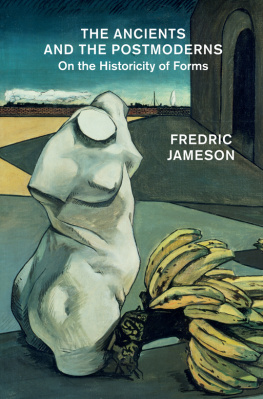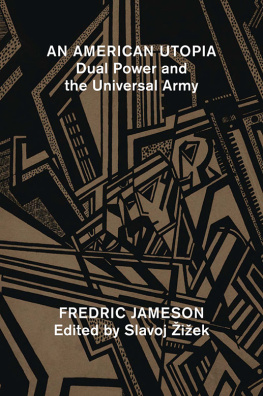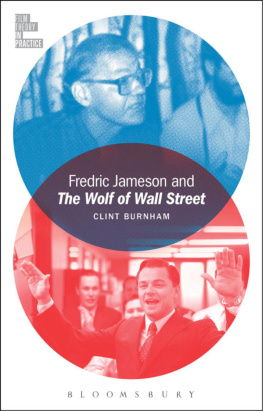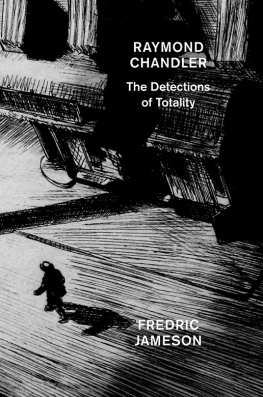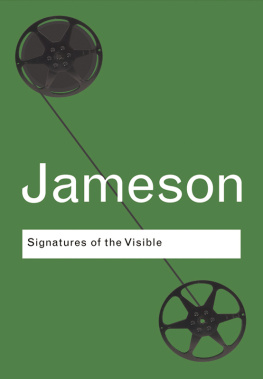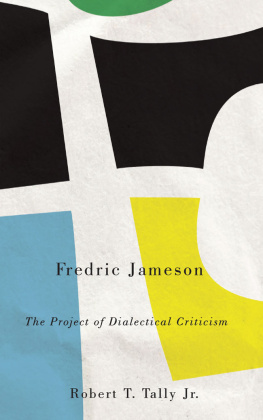Contents

Allegory and Ideology
Allegory and Ideology
Fredric Jameson

First published by Verso 2019
Fredric Jameson 2019
Map in Chapter 3 reprinted with permission of Financial Policy Magazine, March 2, 2016.
The figures in Chapter 4 are reproduced with permission of Oxford University Press through PLSclear from Seth Monahan, Mahlers Symphonic Sonatas, 2015.
Third-World Literature in the Era of Multinational Capitalism, part of Chapter 5, was published originally in Social Text, no. 15 (Autumn 1986).
Appendix A reproduced with permission of the University of Minnesota Press from the authors foreword to Algirdas Julien Greimas, On Meaning, 1970.
All rights reserved
The moral rights of the author have been asserted
1 3 5 7 9 10 8 6 4 2
Verso
UK: 6 Meard Street, London W1F 0EG
US: 20 Jay Street, Suite 1010, Brooklyn, NY 11201
versobooks.com
Verso is the imprint of New Left Books
ISBN-13: 978-1-78873-025-9
ISBN-13: 978-1-78873-045-7 (US EBK)
ISBN-13: 978-1-78873-044-0 (UK EBK)
British Library Cataloguing in Publication Data
A catalogue record for this book is available from the British Library
Library of Congress Cataloging-in-Publication Data
A catalog record for this book is available from the Library of Congress
Typeset in Minion Pro by Hewer Text UK Ltd, Edinburgh
Printed and bound by CPI Group (UK) Ltd, Croydon CR0 4YY
To
Phillip Wegner
and
Kim Stanley Robinson
for mounting the stallion of reading
and
in memory of
Masao Miyoshi and Hayden White
Contents
Some topics need no introduction inasmuch as they are already everywhere the object of dispute or simply because their relevance becomes obvious as soon as they are identified. Others, like this one, require some preliminary account of their significance in the scheme of things, as well as an indication of how they can best be presented. Sometimes an author does this by describing his personal discovery of the subject and its importance: I will not do that here.
But as my starting point in the ideological will seem partisan for some, idiosyncratic for others, and for still others simply old-fashioned, I will need to say why Ideology is none of these things and why it subsumes everything else in culture and the superstructures, assuming the position that religion once held for the first historians and cultural theoreticians of the West. And this will initially require us to identify one of the fundamental obstacles to grasping the centrality of Ideology, namely the conviction that there are areas of life, areas of activity as well as of thought, which are nonideological.
It is an illusion most easily entertained in moments of historical stasis, or at least in places in which ideological or class struggle seems to have been contained and reduced to manageable proportions. There is a certain parallel here with the history of linguistics and in particular with that of the tropes and figures. The study of these linguistic deviations was first made possible by the seemingly obvious (and logical) fact of the existence of a literal language the distortions of which could easily be identified. As tropology advanced, however, and became more secure in the possession of its instruments and analyses, the conviction that there was such a thing as a literal language became shaken and at length disappeared, leaving in its place a more generalized conception of Representation as such which is still with us and which remains the central mystery of this field or problematic. Is it possible, then, that nave realism should find itself confronting the same fate?
As for what will come to be recognized as ideology, the exploration of non-Western social formations produced an explanatory concept, that of Culture, generally identified with Religion, in terms of which the deviations from the norm of Western society could be described, if not exactly explained. But in the course of modernization and secularization, when the variety of social mechanisms became comprehensible in economic terms as modes of production (historical materialism), and when religions themselves became the object of secular analysis as cultural or superstructural formations, then it became possible to grasp the relationship of culture or religion with their economic context, by way of the concept of Ideologyas what the Marxist tradition called base and superstructure (terms whose relevance is not particularly affected by their overfamiliarity or their frequent misuse either).
The usefulness, then, of a generalized notion of Ideology lies in its dual capacity to combine, I will not say the dilemmas of subject and object, or soul and body, but at least the controversies between materialism and idealism that turn on the objective functioning and history of the socioeconomic mechanism on the one hand and the construction of subjectivity on the other. We must credit Louis Althusser for having made an extraordinary beginning on healing this rift, this incommensurability of explanatory codes, with his notion of ideology as a mechanism whereby the conscious (and unconscious) individual biological subject situates himself or herself within the collective social structure: ideology as a kind of unconscious cognitive mapping.
He did not, however, pursue this investigation into the historical realm, that is to say, into the processes where the transformations of subjectivity can be seen to accompany those economic changes in the history of the modes of production; he did not, in other words, inquire But this famous remark, read in its original contort, can be seen to apply specifically to what we would today call the history of ideasthat is to say, a history of ideologies or other cultural symptoms studied in their own right as autonomous phenomena. Just as today we would not study capitalism without taking commodity reification and its attendant subjectivities into account, so alsoexcept for the area of religions as suchfew would undertake an examination of what we still call non-Western cultures without any consideration of the mode of production of which they are both symptomatic and constitutive at one and the same time. Ideology, however, is the watchword for resistance to such disciplinary reifications, and it stands for the unification of objective and subjective fields into a single project, which, from that standpoint of the humanistic disciplines which is ours here, can perhaps best be defined as the examination of the construction and constitution of individual subjectivities and their susceptibility to revolutionary change.
This is then the larger context in which I propose to explore allegory as a fundamental mechanism in that process, in a project that on the one hand deals with representation as such, and on the other with History. But from both these perspectives a new problem emerges, which is that of narrative (and with it, the question of literature itself).
I have elsewhere proposed that we think of the ideologemethe elementary cell or smallest possible intelligible unit of ideologyas a dual structure that can be approached from either side with quite different analytic equipment.psychologists have never really been able to disentangle these twin dimensions of ideology by demonstrating the primacy of the one over the other; meanwhile, Enlightenment (insofar as one is permitted to evoke it historically as a tradition of some kind) has always presupposed the power of rational persuasion as a therapy for doxa in their cognitive forms. The roots of the narrative ideologemes in the form of this or that psychoanalytic primal fantasy have seemed a good deal less accessible, or at best, have seemed to take on purely personal and contingent forms. Althusserian analysis, however, drawing no doubt on Nietzsche fully as much as on Lacan, assumes a constitutive and well-nigh indissoluble link between the subject and narrative as such. The subject is somehow defined by its narratives of itself; and narrative in turn seems always to be wedded in one way or another to the presence of the subject, even when it is a question of the succession of mere objective facts.

